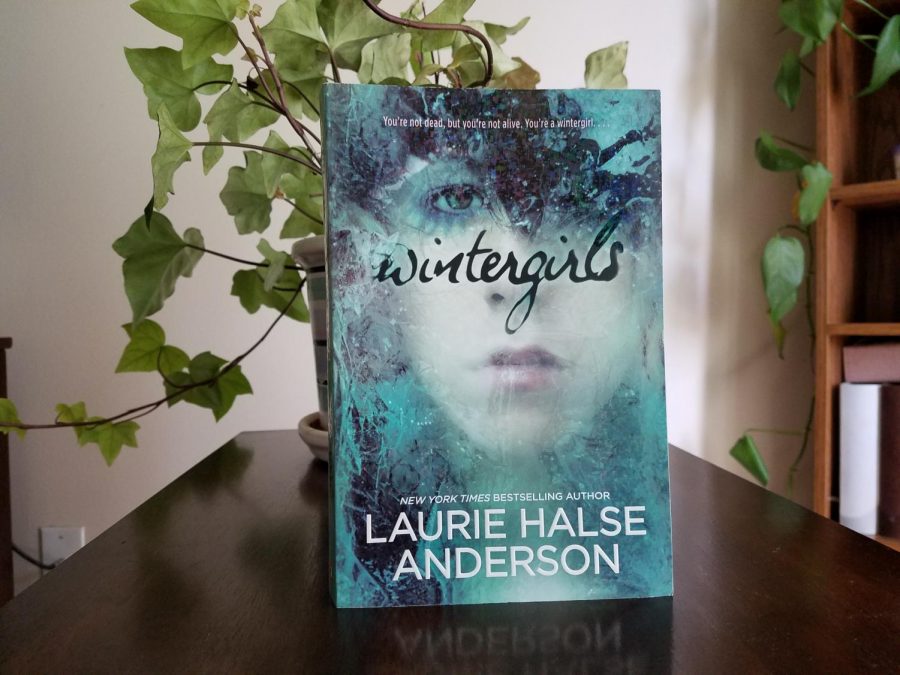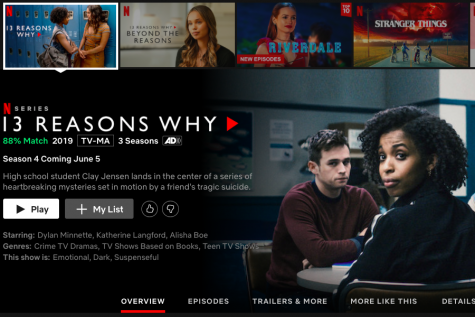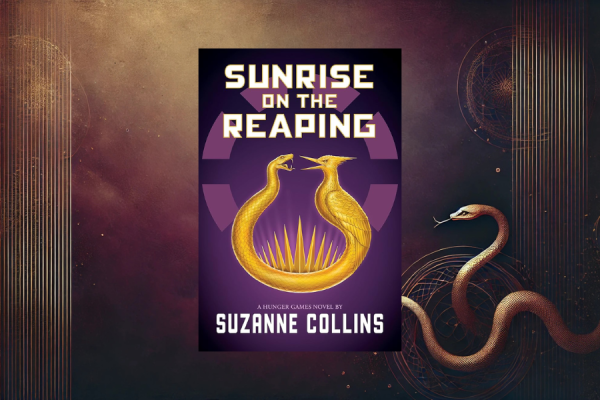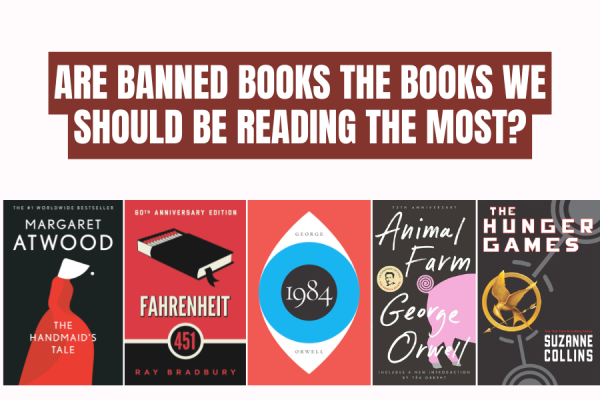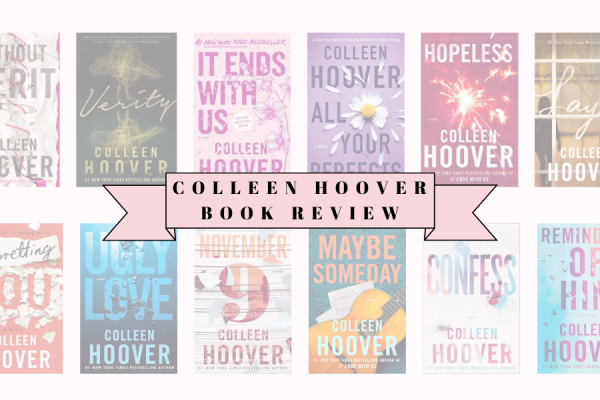Eating disorders are exacerbated by pop culture, quarantine, and beyond
This is Wintergirls, the novel I read that inspired the topic for this article.
Disclaimer: This article discusses eating disorders and disordered eating habits.
I recently read the novel Wintergirls by Laurie Halse Anderson and rewatched the movie To The Bone on Netflix, and I haven’t been able to stop thinking about either one since. These pieces of media cover people dealing with the most fatal mental illnesses there are: eating disorders. While the COVID-19 pandemic is ravaging the world, mental illnesses like eating disorders are worsening.
Wintergirls follows Lia, a girl with anorexia nervosa, dealing with the aftermath of her friend Cassie’s gruesome death. Cassie became part of the 3.9% mortality rate of people with bulimia nervosa, and this novel did not romanticize it.
Reading Wintergirls was like being trapped inside Lia’s head, listening to all her self destructive thoughts, and watching her fall into a spiral of disordered thinking. The book didn’t shy away from the horrifyingly fatal nature of these disorders, and while I adored this novel, it was dark and difficult to read because it didn’t shy away from reality.
To The Bone follows a girl named Ellen who is entering a new treatment center with a new doctor and her overall experience in recovery. Now, overall I liked this movie because I felt Ellen and the other characters’ disorders were not romanticized or glorified, but there were some parts I had problems with.
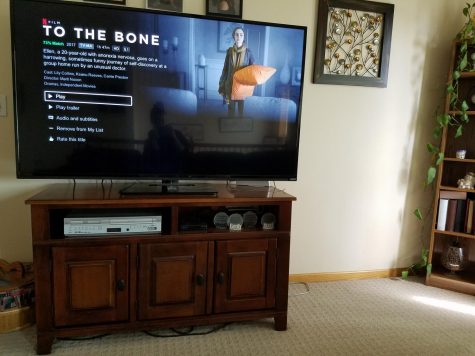
To The Bone is the movie that also helped inspire the topic for this article.
The mental health professionals in the movie were seemingly more detrimental than helpful to Ellen’s situation, and some of the humor was in bad taste, but the movie showed many things that aren’t shown in other books and movies.
Other people in the treatment center had a range of disorders and body types; for example, one of the characters was pregnant, showing the highly underrepresented demographic of women with eating disorders who are struggling with wanting to have their child and the difficulty of pushing themselves to recover so their child can live. (If you want to know more about To The Bone and its successes and problems, there is a review linked here from Emma Giordano, who is in college to get her master’s degree in mental health counseling and is in recovery for her own eating disorder.)
So many times in pop culture, eating disorders are portrayed as straight, white, middle-class teenage girls with low body weight; while that is the experience of some people, there are so many groups left out of that representation. People of color, queer people, men, and people with lower socioeconomic status are not going to have this same experience, and it’s important to show this side of the story as well.
Along with that, not everyone with an eating disorder has low body weight. If that is never portrayed, someone with an undiagnosed or hidden eating disorder may think they aren’t “sick enough” to get help, which can lead to their disorder worsening.
Another thing that can lead to the worsening of eating disorders is the spread of pro-eating disorder content online. There are pro-eating disorder websites in which people with disordered eating can talk to each other about goal weights and techniques, share “thinspiration” (thin inspiration) pictures of emaciated figures they wish to look like, and even discourage recovery. A few years ago, I accidentally came across one of these websites when I was researching mental health. It’s been almost four years and I haven’t been able to forget some of the things I saw.
Not only are there separate websites for the promotion of harmful habits, but there are subcultures on platforms like Twitter, Instagram, Tumblr, Pinterest, and one of the most problematic ones at the moment: TikTok. While most of the other applications mentioned have policies against the publication of pro-eating disorder content and measures they take to remove the content from their platform, TikTok has let this subculture grow, even recommending pro-eating disorder content on the For You page. Even on platforms where there are restrictions against pro-eating disorder content, users have found ways around them like using misspellings of usual slang and codes for different content.
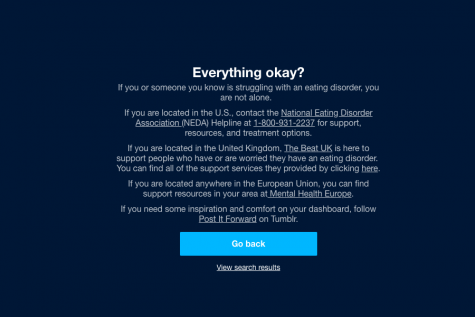
This is a warning that pops up on Tumblr if you attempt to search certain pro-eating disorder keywords.
Studies have found the impact of these communities on people with disordered eating to be negative, and that users who frequented these sites were more prone to dissatisfaction with their own body image and had disturbances in normal eating habits. This just shows how there needs to be stricter guidelines and enforcement of said guidelines or people’s lives can be seriously affected, and even ended.
Now that the country is in quarantine with a stay at home orders extending every few weeks, eating disorders are in their perfect environment. They thrive off of social and emotional isolation and from the fear of food and health to isolation and seemingly endless free time, recovery is at a disadvantage. If someone is quarantined alone, they are at an even greater disadvantage because there is no one there to help them if they are relapsing into old habits.
Those with low weight and anorexia nervosa may even be more at risk for complications if they contract COVID-19 because of their compromised physical health. For those with bulimia nervosa or binge-eating disorder, tensions can run high between them and family members if they are eating large amounts of food and purging afterward or secretly eating large amounts of food multiple times a day, therefore wasting food when there are shortages in stores. These increased tensions can also lead to increased depression and anxiety and an increased likelihood of suicide and self-harm.
The COVID-19 pandemic is affecting the physical health of the world, but it is also heavily impacting people’s mental health, and if pre-existing or new mental health struggles are not properly dealt with, it can seriously harm someone’s quality of life in the present and the future.
If you are struggling with an eating disorder or other mental health issues, consider contacting a helpline:
National Eating Disorder Association: 1-800-931-2237
National Suicide Prevention Lifeline: 1-800-273-8255
National Youth Crisis Hotline: 1-800-448-4663
Substance Abuse and Mental Health Services Administration (SAMHSA): 1-800-662-4357

Emma LeMieur is a junior at Sartell High School. She is involved in band and morning drumline at the school and loves them both. In her free time, she...



